Key takeaways
- U2 is celebrated for their storytelling ability, combining emotion with political themes in their music, particularly in “The Joshua Tree” album.
- The Joshua Tree blends various musical styles, addressing themes of yearning, hope, and social issues, making it resonate deeply with listeners.
- The album fosters a communal experience among fans, encouraging reflection on personal struggles and inspiring lifelong devotion.
- Attending U2 concerts creates an emotional journey, enhancing the connection between the band and audience through shared moments of music and energy.
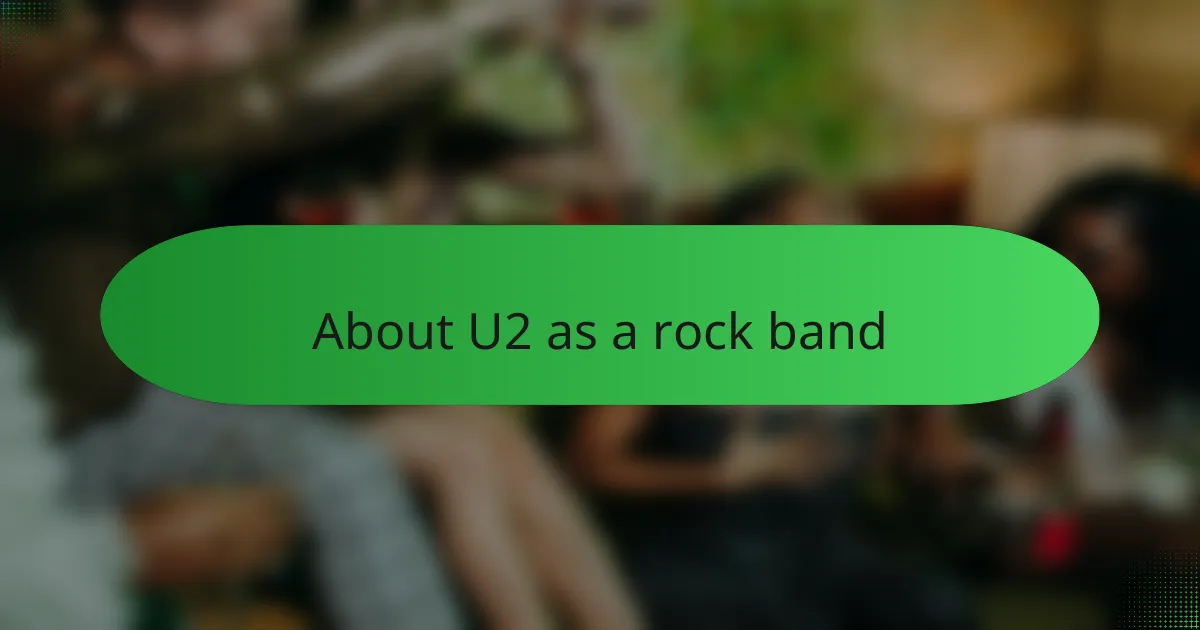
About U2 as a rock band
U2 has always struck me as more than just a rock band; they’re storytellers who channel a unique blend of passion and politics through their music. Have you ever noticed how their sound shifts yet remains unmistakably theirs? It’s that ability to evolve while staying true to their core that makes them stand out to me.
What fascinates me the most is their chemistry as a group—Bono’s voice carries so much emotion, while The Edge’s guitar creates those iconic echoes that you can’t forget. How often do you find a band where every member feels equally vital, not just as musicians but as collaborators shaping something bigger together?
Listening to U2 reminds me of live shows where the energy feels almost spiritual, like you are part of a collective experience rather than just an audience. Doesn’t that kind of connection make rock music feel alive in a way few bands achieve? For me, that’s what makes U2 an unforgettable presence in the rock world.
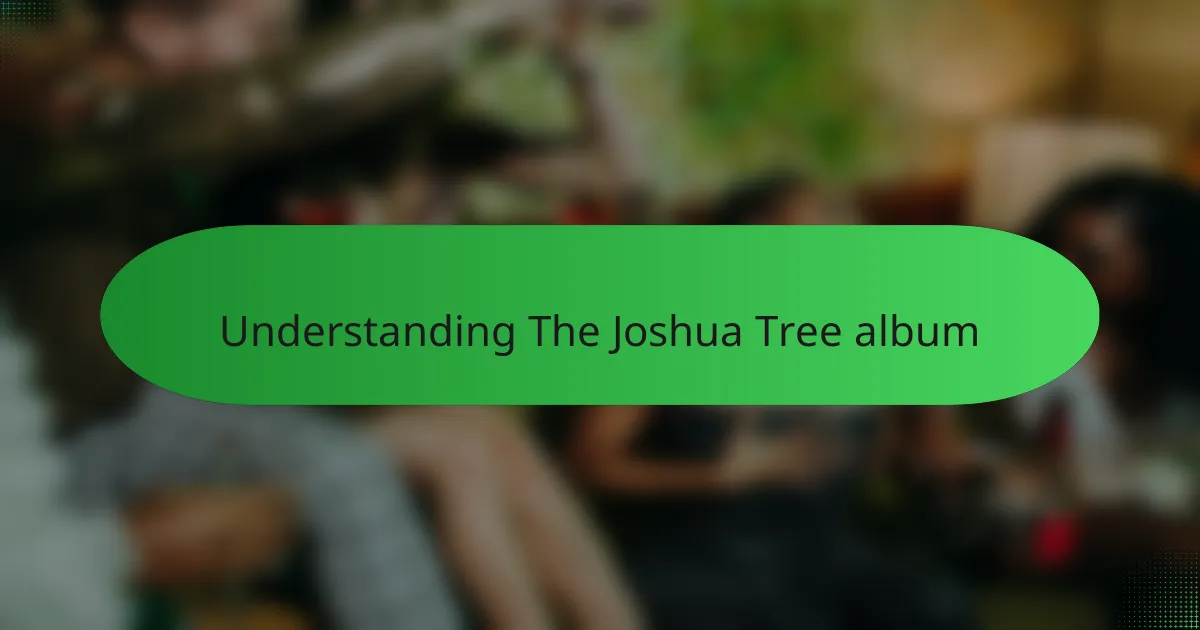
Understanding The Joshua Tree album
The Joshua Tree album feels like a sonic journey through vast landscapes and deep emotions. When I first listened to it, I was drawn to how the music seemed to capture both a sense of yearning and hope, wrapped in melodies that linger long after the song ends. Have you ever had that experience where an album doesn’t just play but actually speaks to something inside you?
What really stands out to me about this album is the way U2 blends American roots music with their distinct rock sound. It’s like they’re bridging different worlds—blues, folk, and rock—yet the result sounds entirely fresh and timeless. The rawness in tracks like “Where the Streets Have No Name” makes me feel like I’m running through an open desert, free but searching.
I also appreciate how The Joshua Tree delves into themes beyond the usual love songs. It tackles political struggles and spiritual quests, making every listen a deeper exploration. Sometimes, I catch myself reflecting on moments in my own life while Bono’s voice carries those urgent, heartfelt lyrics. Doesn’t it make you wonder how powerful music becomes when it mirrors the complexities of real life?
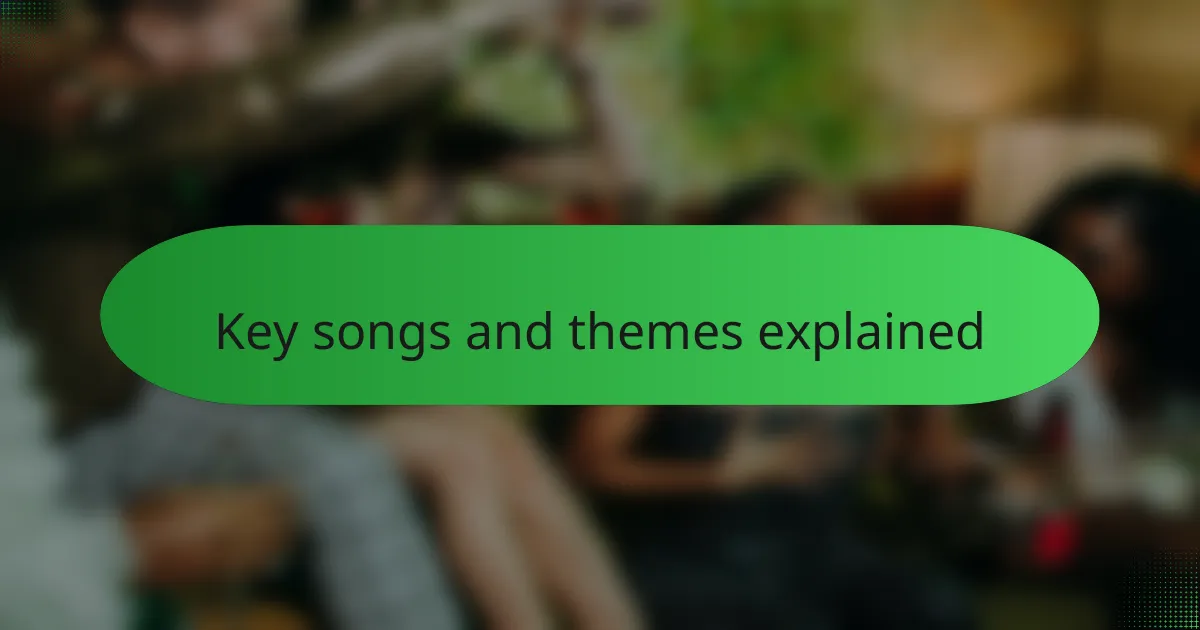
Key songs and themes explained
One song that always hits me deeply is “With or Without You.” There’s this tension in the lyrics and the music—like a push and pull between love and loss—that feels incredibly personal. Have you ever listened to a song that somehow captures the messy emotions you can’t quite put into words? That’s exactly what this track does for me.
Then there’s “I Still Haven’t Found What I’m Looking For,” which to me speaks to that restless human spirit, always searching for meaning and belonging. The gospel-like chorus lifts you up, making the song feel both intimate and universal. It’s a reminder that the journey is as important as the destination—something I often reflect on in my own life.
And how can I forget “Where the Streets Have No Name”? The building crescendo and those soaring guitars make me picture endless horizons and the freedom to start anew. When I hear it live, the energy is almost overwhelming, like being part of something bigger than yourself. Doesn’t music like this make you believe in possibility again?
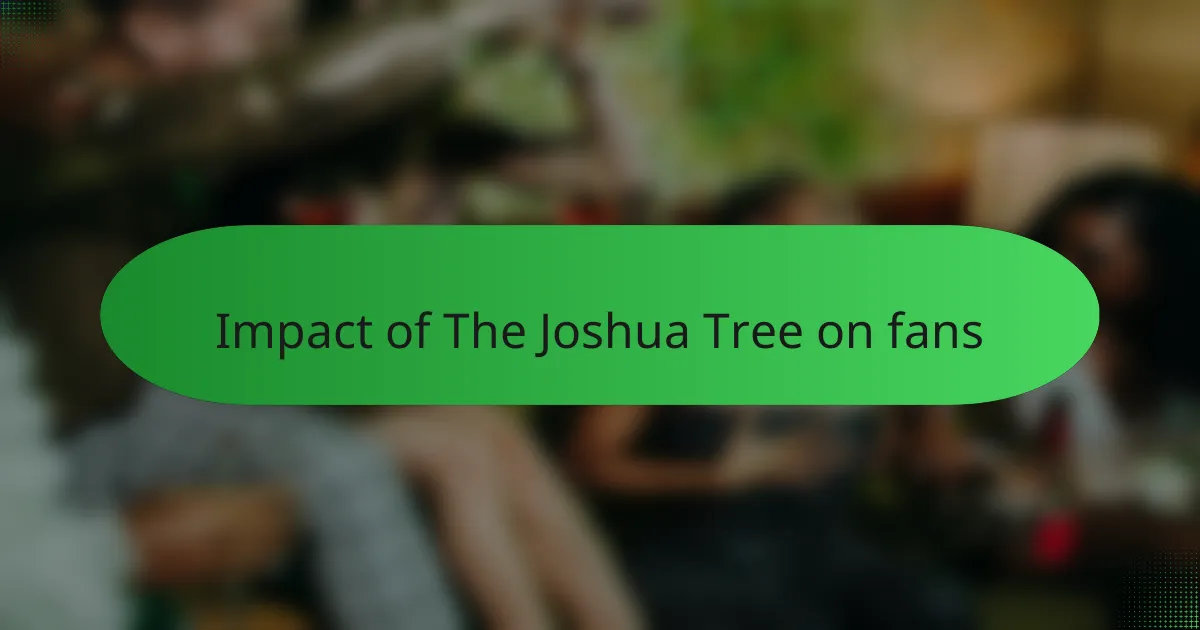
Impact of The Joshua Tree on fans
The Joshua Tree didn’t just shape my taste in music; it felt like it reshaped my perspective on what a rock album could do to a fan. I remember the first time I heard “With or Without You” on the radio—I was stunned by how deeply it resonated, almost as if it understood emotions I hadn’t fully grasped yet. Have you ever had that moment where a song feels like it’s speaking directly to your heart?
What really struck me about the album’s impact on fans is the communal experience it inspired. At concerts and even in casual conversations, I noticed how people from different walks of life connected through these songs. It’s rare that music creates a shared language that breaks down barriers, but The Joshua Tree did just that. I think that’s why its fans remain so devoted decades later.
Even beyond the music, The Joshua Tree seemed to inspire reflection and hope. Listening to it in quiet moments made me think about my own struggles and dreams—something Bono’s voice gently encouraged without ever preaching. Did you find yourself thinking more deeply about life or justice because of this album? For me, that kind of impact is what turns a fan into a lifelong believer.
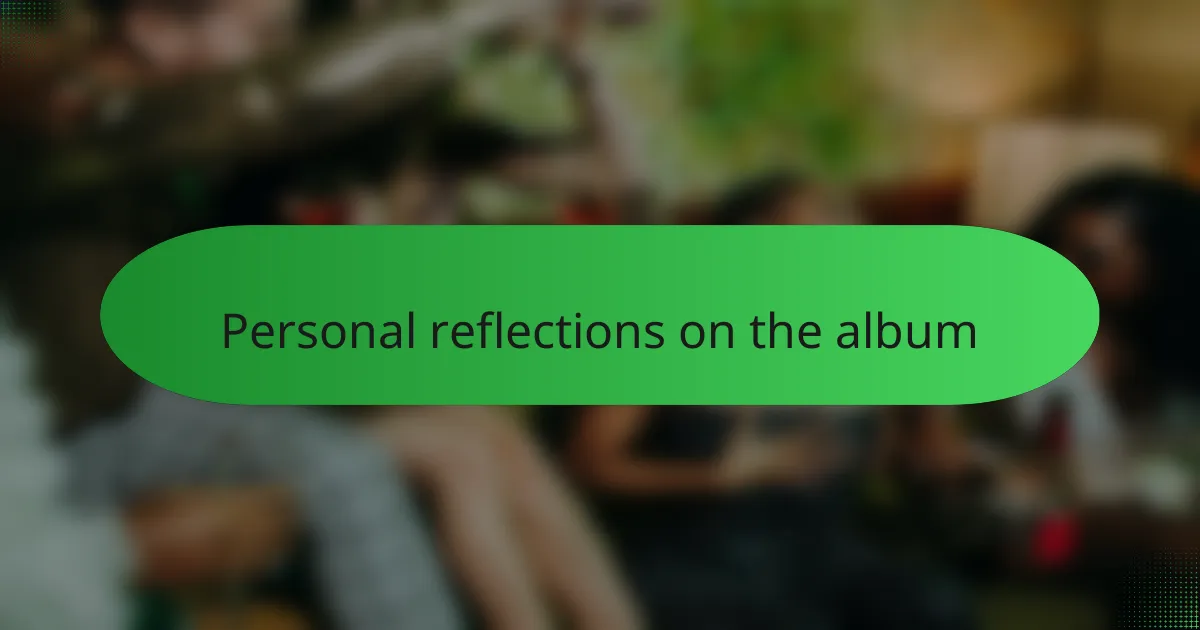
Personal reflections on the album
Listening to The Joshua Tree for the first time felt like peeling back layers of my own thoughts and emotions. The way the album weaves longing and hope made me pause and really reflect on moments when life felt both beautiful and uncertain. Have you ever had an album reach inside you like that, stirring feelings you didn’t even realize were there?
One particular experience that stays with me is revisiting the album during a tough period. Songs like “I Still Haven’t Found What I’m Looking For” became a kind of anthem, reminding me that searching is okay, even necessary. It made me wonder—how often do we rush through life without embracing the uncertainty that shapes us?
What I find most powerful is how The Joshua Tree continues to reveal new layers with every listen. It’s not just background music; it invites me to sit with its stories and emotions, almost like having a quiet conversation with an old friend. Isn’t that the sign of a truly timeless album?
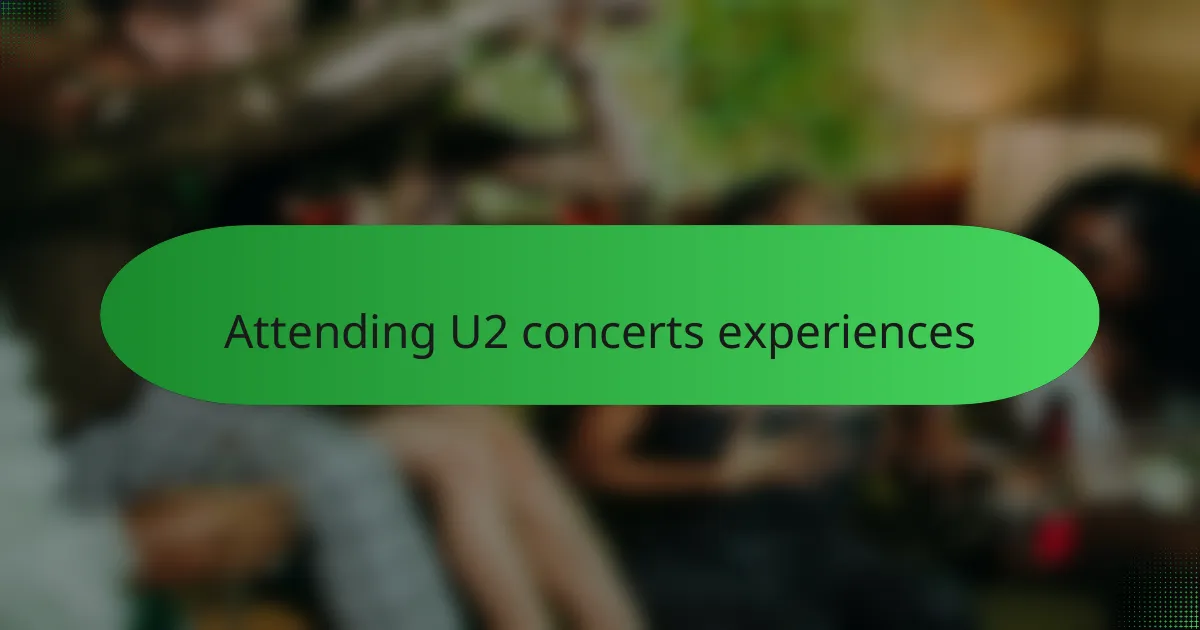
Attending U2 concerts experiences
Attending a U2 concert always feels like stepping into a living, breathing masterpiece. The first time I saw them perform songs from The Joshua Tree live, I was overwhelmed by how every note seemed to carry the same depth and passion as the album but amplified by the crowd’s energy. Have you ever been somewhere where the music isn’t just heard but felt in every fiber of your being? That’s exactly what U2 delivers in concert.
One moment that stays with me is when the opening chords of “Where the Streets Have No Name” filled the arena—it’s like the whole audience was lifted into a shared moment of hope and freedom. The way the lights and Bono’s voice created that almost holy atmosphere made me realize that concerts aren’t just shows; they’re emotional journeys. Doesn’t being part of something so powerful change how you connect with a band forever?
What I appreciate most is how U2 makes every fan feel involved, offering glimpses into their stories while still allowing space for personal reflection. It’s not just a performance; it’s a dialogue between the band and the crowd. Have you noticed how rare it is to find bands that can create that kind of intimacy on such a massive stage? For me, that’s what keeps me coming back to their shows.

Collecting memorabilia and fan tips
Collecting U2 memorabilia, especially items connected to The Joshua Tree era, has become a deeply rewarding part of my fan journey. I remember the thrill of scoring an original vinyl pressing at a local record shop—there’s something magical about holding that tangible piece of music history, as if you’re touching a moment frozen in time. Have you ever noticed how owning a band’s memorabilia makes your connection to their music feel more personal, almost like a shared secret?
One fan tip I can’t stress enough is to verify the authenticity of memorabilia before purchasing, especially when browsing online. I’ve learned the hard way that some items may look genuine but lack proper provenance, which can be disappointing. Seeking out reputable sellers or fan community recommendations has saved me from regret more than once. Isn’t it better to trust the collective knowledge of devoted fans who’ve walked this path before?
Also, consider complementing your collection with concert memorabilia—tickets, posters, or even personal photos if you’ve attended shows. These pieces carry stories and emotions that studio releases alone can’t capture. For me, looking at a ticket stub from a Joshua Tree anniversary concert brings back the roar of the crowd and Bono’s electrifying presence. Doesn’t that kind of memory turn a simple keepsake into a cherished artifact?